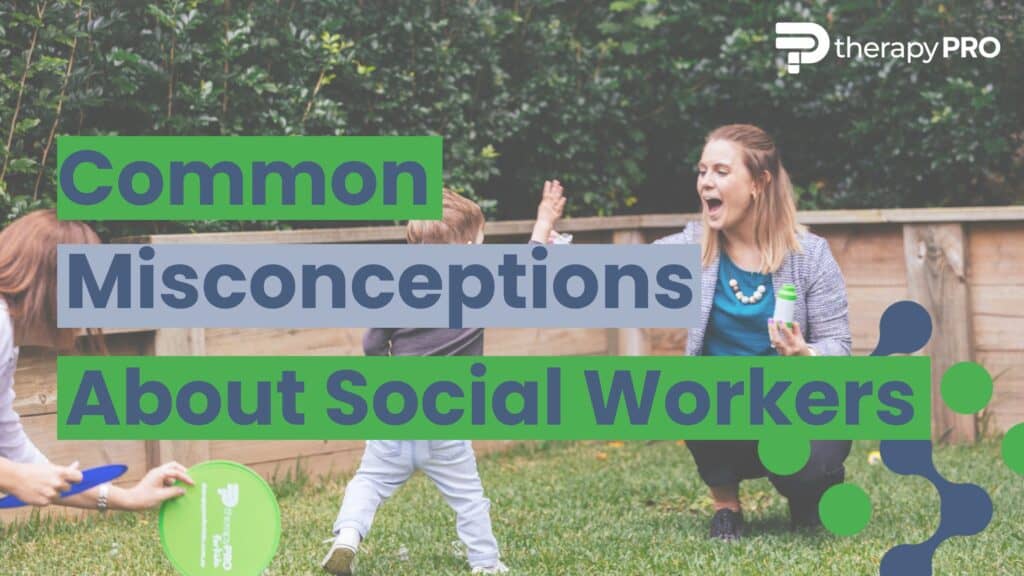Common Misconceptions About Social Workers
There are many common misconceptions about social workers and the role they play within the allied health space.
Social workers are often misunderstood and misrepresented in popular media and public perception.
In this article, we’re going to debunk some of the common misconceptions about social workers, with a focus on those that our National Disability Insurance Scheme (NDIS) clients and support coordinators have shared with us.
But first, let’s look at what social work at Therapy Pro looks like and feels like.
Social work at Therapy Pro
Therapy Pro social workers practise across the lifespan, meaning they support people of all ages, meeting the whole life needs of people with disability.
How can a social worker help? Here at Therapy Pro, our social workers are qualified in psycho-social assessments, planning and therapeutic interventions providing a holistic approach, supporting the individual, family, carer, and community collaboratively to support people in achieving their desired goals.
As a mobile therapy provider, our therapists work face-to-face in the community. Our social workers support individuals in their chosen environment, whether that’s at their home, in a park, at school, or a community centre.
Working in this way offers our socials workers a unique and holistic view of the ways in which the individual engages with their social world.
Therapy Pro social workers operate “in the complex”
When we talk about “in the complex”, we mean the complexity in relationships and complexity in situations experienced by a person.
In this way, Therapy Pro social workers develop evidence-informed assessments, planning, and therapeutic interventions within a strengths-based framework.
This framework considers the impact of the individual’s health, psychosocial, or other needs and support systems. It aims to work towards enabling people with disability to choose how they live their life.
Social work within the NDIS
With social work only being added as its own line item on the NDIS last year (previously other), it is understandable that those outside of the allied health world might have less awareness about the role of a social worker.
Through enquiries, conversations, feedback and questions from our NDIS clients and support coordinators and referrers, we have been presented with some common misconceptions about social workers.
Therapy Pro Lead Social Worker, Gwen, shares her knowledge and insights to debunk these misconceptions and clarify the important role of social workers within both Therapy Pro and the wider allied health profession.
Misconception #1
Social workers interfere with people’s lives
For some families, the mention of a social worker may make them uncomfortable, particularly if they believe that involving a social worker in their NDIS plan will lead to child services involvement.
Lead Social Worker Gwen clarifies this association between Therapy Pro social workers and child services:
“All allied health professionals have the same duty of care to report on child safety – our social workers work in disability, not child safety.”
As Gwen illustrates, all NDIS therapists have the same responsibilities regarding children’s safety. It is in everyone’s best interest that families stay together – social workers are dedicated to strengthening families and assisting at-risk children and families.
Whether this is done entirely by the social worker, or the social worker assists in gaining access to resources and programs, social workers will do everything in their power to build the capacity of the family and children.
Above all, social workers respect self-determination and human rights.
Social workers strive to give clients the freedom of choice and empower their decisions, leading to greater satisfaction in everyday life.
Through holistic analysis, social workers offer a unique and valuable contribution to providing and advocating for appropriate and targeted services to meet the complex needs of individuals, their families, and communities.
Misconception #2
Anyone can do what a social worker does
Another one of the common misconceptions about social workers is that anyone can do what a social worker does.
Like all Therapy Pro therapists, our social workers are registered allied health professionals, having undertaken multiple years of tertiary education.
Several of our professionally qualified social workers are also accredited in disability and/or mental health, This involves completing ongoing annual professional development and adhering to professional practice guidelines.
These qualifications and accreditations allow social workers to offer a range of services, including but not limited to the following:
- Clinic assessments
Psychosocial assessments, behavioural, functional and risk assessments
- Capacity building
With the client and the family, providing family work and parenting, psychoeducation, accessing educational opportunities and employment opportunities, retaining accommodation and tenancy, and building social skills and confidence
- Clinical guidance of care coordination
Collaborating in multidisciplinary teams, stakeholders, guardianship and supporting decision making.
- Advocacy
Supporting clients to be self-advocates and to advocate on their behalf, if necessary, with QCAT, Centrelink, Youth Justice.
- Counselling and therapeutic approaches
Offering individual, family and group work. Grief and loss, adjustment to disability, emotional aspects of life transitions, family therapy, strengths-based solution-focused therapy.
- Planning
Clinical input facilitates planning by providing information about resources to maximise choice and opportunities for the person to achieve what they want.
- Mediation and conflict resolution
Support people with disability to resolve conflicts and coordinate crisis interventions.
- Specialist expertise
-
- The impact of disability, abuse, neglect, and family violence
- Mental health including carer issues of chronic sorrow and depression
- Complex family dynamics and limited social supports
- Homelessness and inappropriate accommodation
- Supporting traumatic experiences and crisis
- Addressing transition points in people’s lives
- Socio-legal and ethical decision making.
Misconception #3
A psychologist or psychiatrist are the only options for psychotherapy or mental health services within the NDIS
Registered social workers can provide psycho-social therapeutic interventions and therapy to clients with disability and mental health.
Social workers provide emotional regulation strategies, develop social skills, build confidence, and support clients through adjusting to disability, grief/loss, and life transitions across the life span.
Social work can provide psychotherapy and other mental health interventions such as safety planning and risk management.
Social workers do not do psychological diagnoses or assessments for intelligence or personality. That is the domain of psychology.
Taking a holistic approach to psychotherapy, social workers offer a unique lens, looking at the person’s needs within the context of all their external factors, such as family, work, and communities.
Social workers analyse and offer evidence-based solutions to the correlations between larger social issues and the individual’s personal situation.
Misconception #4
Social work and support work services are interchangeable
Social work and support work services are both important fields that focus on helping people in need, however, they are not interchangeable.
Social workers value the relationship with support workers and recognise their incredible work with clients.
Support workers have a range of responsibilities and roles, offering a variety of services, depending on qualifications.
Support workers are focused on providing practical assistance to individuals who require support to meet their day-to-day needs. They may provide services such as personal care, meal preparation, transportation, and other forms of practical assistance such as:
- Domestic support such as helping with laundry, gardening, and housework
- Social support such as companionship in and outside of the home, at social groups or events
- Personal care such as showering, toileting, and manual transfer
- Nursing services for which they are trained, such as wound, diabetes, or catheter care
A key difference between social work and support work services is the level of training and education required. Social workers typically require a degree, usually in social work, along with registration or certification within their state.
Another key difference is the scope of practice. Social workers are trained to work with individuals, families, groups, and communities, and may provide a range of services beyond practical assistance. Support workers, on the other hand, are more likely to primarily work with individuals on a practical level.
At Therapy Pro, our social workers offer a unique lens in disability and provide a clinical role to inform multidisciplinary teams or support workers in complex social, psychological, family, and institutional dynamics.
World Social Worker Day: 21 March 2023

World Social Worker Day (WSWD) is an initiative of the Australia Association of Social Workers. It aims to celebrate the social work profession and promote the vital work of social workers to the Australian community and globally.
The theme for 2023 is “Respecting Diversity Through Joint Social Action”, and here at Therapy Pro, we are committed to supporting the wonderful role social workers play within the NDIS space and the allied health profession.
We recognise that social workers promote social justice and human rights by addressing the root causes of social problems such as poverty, discrimination, domestic and family violence, and oppression. Above all, they respect the dignity and autonomy of their clients and work with them collaboratively to find solutions that meet their needs and goals.
Additional reading and resources
Within our Therapy Pro social worker team, we have a breadth and depth of experience across a range of areas. For further reading, a Therapy Pro for Kids Social Worker shares their insights into social work within the early childhood space.
Sign up to our newsletter below to learn more about the support services provided by Therapy Pro.




